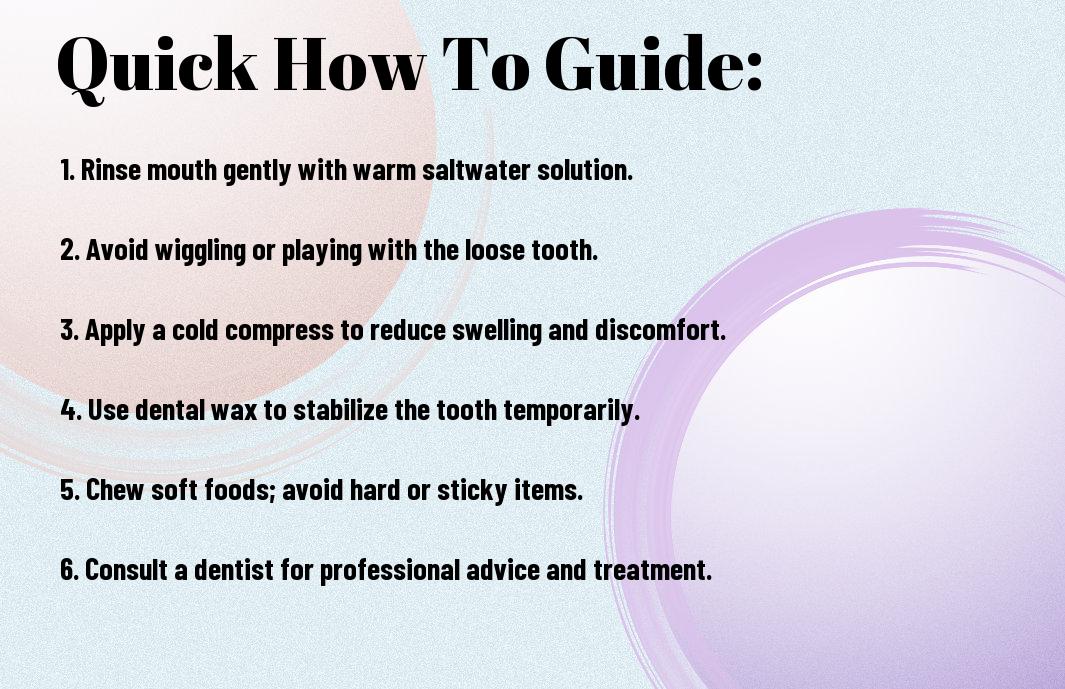This guide provides you with effective methods to tighten a loose tooth quickly and safely. Whether it’s due to injury, gum disease, or other factors, a loose tooth can be concerning. You’ll learn several techniques, from at-home remedies to dental advice, enabling you to address the issue properly. By following the steps outlined, you can help stabilize your tooth and promote healing, ensuring you can maintain your oral health with confidence.

Key Takeaways:
- Consult a Dentist: Always seek professional advice if a tooth feels loose, as this could indicate an underlying dental issue.
- Saltwater Rinse: Gargling with a warm saltwater solution can help reduce inflammation and promote healing around a loose tooth.
- Maintain Oral Hygiene: Keeping the mouth clean by brushing and flossing regularly can help support the gums and surrounding teeth.
- Soft Foods: Eating softer foods can alleviate pressure on the loose tooth, reducing the risk of further loosening.
- Cinnamon or Clove Oil: Applying these natural remedies might provide relief from discomfort and help tighten the gum tissue around the tooth.

Understanding Loose Teeth
For many, experiencing a loose tooth can be unsettling. This condition might occur in children due to their natural growth process, but adults can also face this issue for various reasons. Understanding what leads to a loose tooth is the first step towards identifying the appropriate measures to address the situation. Whether it’s a result of dental trauma, gum disease, or other factors, recognizing the underlying cause is key to restoring your oral health.
Common Causes of Loose Teeth
On your journey to understanding loose teeth, it is important to recognize that several factors can contribute to this problem. Some of the most common causes include:
- Gum disease
- Injury or trauma
- Bone loss
- Excessive grinding or clenching
- Underlying health conditions
This knowledge can aid you in taking proactive steps to seek the necessary treatment.
Factors Affecting Tooth Stability
Tooth stability can be influenced by a variety of factors, making it important for you to understand what might be affecting your teeth. These factors include:
- Overall oral hygiene
- Frequency of dental check-ups
- Diet and nutrition
- Smoking or tobacco use
- Hormonal changes
This information equips you with the insights needed to maintain and improve your dental health.
The factors affecting tooth stability can significantly influence whether your teeth can regain strength or are at risk of becoming loose. Prioritizing your oral hygiene, maintaining nutritious eating habits, and abstaining from harmful substances can greatly enhance your dental stability. Regular dental visits allow for early detection and management of any concerns. By addressing these factors, you can take charge of your dental well-being.
- Seek professional dental advice regularly
- Practice effective oral care routines
- Adopt a balanced diet rich in important nutrients
- Be mindful of harmful habits like smoking
- Consider monitoring significant hormonal changes
This proactive approach can foster stronger teeth and minimize the risk of looseness.
Quick Tips to Tighten a Loose Tooth
One of the best ways to address a loose tooth is to follow these practical tips:
- Gently wiggle the tooth to promote blood flow.
- Rinse your mouth with warm salt water to reduce inflammation.
- Maintain proper dental hygiene by brushing and flossing around the affected area carefully.
- Apply a cold compress on the outside of your mouth to alleviate pain.
- Consult your dentist for a professional evaluation and treatment.
Recognizing the importance of timely action will help in managing your dental health effectively.
Home Remedies for Immediate Relief
With a loose tooth, several home remedies can provide immediate relief. You can try using clove oil, which has natural analgesic properties, to soothe the area. A warm saltwater rinse can help reduce bacteria and support healing, while applying a cold compress can alleviate discomfort. Make sure to avoid any foods or habits that might exacerbate the issue until you see a dentist.
Dietary Recommendations
Quick adjustments to your diet can support your dental health while dealing with a loose tooth. Focus on consuming soft foods that do not require excessive chewing, such as yogurt, mashed potatoes, and smoothies to avoid putting unnecessary pressure on the loose tooth.
Tooth-friendly options also include foods rich in calcium and vitamin D to promote strong teeth, such as leafy greens, cheese, and fish. Nutrient-dense foods help strengthen the gums and supporting structures around your teeth, which is important for recovery. Limiting sugary snacks and acidic beverages is also advisable, as they can weaken tooth enamel and potentially worsen your situation.
Dental Treatments for Loose Teeth
Your loose tooth may require professional dental treatments to regain stability. Common options include splinting, where neighboring teeth are bonded to the loose one for support, and periodontal treatments that address underlying gum issues. In some cases, dental implants or bridges may be recommended if the tooth cannot be saved. It’s crucial to act promptly to prevent further complications.
When to Consult a Dentist
Consult a dentist if your loose tooth is accompanied by bleeding, swelling, or severe pain. Additionally, if the looseness persists for more than a few days, it’s vital to seek professional help. Early intervention can often prevent more extensive damage and ensure a better chance of saving your tooth.
Recommended Dental Procedures
Recommended treatments for a loose tooth depend on the underlying cause and severity of the situation. Your dentist may suggest a dental splint to stabilize the tooth, or recommend a deep cleaning to address gum disease. In cases where the tooth is severely compromised, extraction may be necessary, followed by options like implants or dentures.
A dental splint is a common procedure where your dentist uses a resin or wire to bond the loose tooth to adjacent stable teeth, providing needed support. For those with gum disease, scaling and root planing may be performed to remove plaque buildup and promote gum health. If the tooth is beyond repair, extraction can lead to a discussion about replacement options like dental implants that look and function like natural teeth, ensuring your smile remains intact.
Preventive Measures for Tooth Stability
Keep your teeth stable by incorporating preventive measures into your daily routine. Simple lifestyle choices and proper oral hygiene can significantly contribute to stronger, healthier teeth. Regular dental check-ups and taking proactive steps can minimize the chances of a loose tooth, ensuring that your smile stays intact and vibrant.
Oral Hygiene Tips
Now, focus on enhancing your oral hygiene practices to maintain tooth stability. Follow these important tips:
- Brush your teeth twice a day with fluoride toothpaste.
- Floss daily to remove plaque between teeth.
- Rinse with an antimicrobial mouthwash to reduce bacteria.
- Limit sugary foods and beverages that can weaken tooth enamel.
Knowing how to practice effective oral hygiene can help protect your teeth from becoming loose over time.
Lifestyle Changes
If you’re looking for ways to enhance your tooth stability, consider implementing lifestyle changes. Regular exercise, a balanced diet rich in vitamins and minerals, and reducing stress can all contribute to healthier teeth and gums.
This holistic approach to your oral health emphasizes that a nutritious diet, particularly one high in calcium and vitamin D, supports bone density and tooth stability. Furthermore, minimizing habits such as grinding your teeth or chewing on hard objects can prevent unnecessary stress on your teeth. By integrating these lifestyle adjustments into your daily life, you not only protect your teeth but also enhance your overall well-being.
How to Care for Your Teeth Post-Treatment
Despite the effectiveness of treatment, maintaining proper care for your teeth afterwards is key to ensuring they remain strong and healthy. Regular dental check-ups, brushing, and flossing will help you keep any re-tightened teeth stable. Pay close attention to your dental hygiene routine and be mindful of your diet, avoiding hard or sticky foods that could jeopardize your results. Your oral care will play a significant role in the overall success of the treatment.
Recovery Guidelines
You should anticipate some minor discomfort following your treatment. To aid recovery, ensure you follow your dentist’s instructions closely, which may include avoiding certain foods and practicing gentle oral hygiene. Ice packs can help reduce swelling, and over-the-counter pain relief may be considered if needed.
Long-term Care Tips
Assuming you prioritize oral health, there are effective long-term care strategies you can adopt. Regular dental visits are vital, as well as maintaining consistent brushing and flossing habits. Other beneficial practices include:
- Using fluoride toothpaste to strengthen enamel
- Avoiding sugary snacks that can lead to decay
- Keeping hydrated to promote saliva production
Any changes or discomfort should prompt you to consult your dentist promptly.
With these long-term care tips, you set a foundation for healthy teeth and gums. Regularly assess your oral hygiene practices and consider additional tools such as an electric toothbrush or mouthwash. Ensuring a balanced diet rich in vitamins can also support your dental health. Pay attention to your body’s signals and adjust your habits accordingly:
- Consider dental sealants for added protection
- Practice stress-relieving techniques to prevent teeth grinding
- Limit tobacco and alcohol consumption
Any improvements you make will contribute to your lasting dental wellness.
Myths and Facts About Loose Teeth
Once again, there are several misconceptions surrounding loose teeth that can mislead you. Many people believe that loose teeth are a natural part of aging or that they always indicate a serious dental issue. In reality, while loose teeth can be concerning, they can also be attributed to various factors such as gum disease, trauma, or even changes in your oral health habits. Being informed will help you discern fact from fiction regarding your dental well-being.
Debunking Common Misconceptions
Even seasoned dental patients might fall prey to misconceptions about loose teeth, thinking they’re always the result of dental negligence or trauma. While these may be factors, loose teeth can also arise from temporary conditions, such as certain medications or hormonal changes. Understanding these factors can help you approach the situation more rationally and effectively.
Understanding Tooth Health
Myths surrounding tooth health can often undermine your understanding of what contributes to strong and stable teeth. While some believe that loose teeth are solely a result of aging, the truth is that various elements, like diet, oral hygiene, and genetic predispositions, play significant roles in tooth stability.
Tooth stability is influenced by the health of your gums, the strength of your jawbone, and your oral hygiene habits. Poor dental care can lead to gum disease, which is a common cause of tooth loosening. On the other hand, a balanced diet rich in vitamins and minerals can fortify your teeth and gums, helping prevent looseness. Staying proactive with dental check-ups will also keep your oral health in check, ensuring your teeth remain strong and secure.
To wrap up
As a reminder, if you find yourself with a loose tooth, maintaining proper oral hygiene is imperative for stabilizing it. You should stick to soft foods and avoid hard or sticky items that could worsen the looseness. Gentle saltwater rinses can help soothe your gums, while avoiding excessive pressure on the tooth is important for its longevity. Always consult your dentist, as professional advice can provide tailored solutions that ensure the health and safety of your teeth. Taking these steps can help you manage a loose tooth more effectively.
Q: What are some home remedies to tighten a loose tooth quickly?
A: There are several home remedies that may help tighten a loose tooth. One common method is to rinse your mouth with warm salt water, which can help reduce inflammation and promote healing. Additionally, applying a mixture of clove oil and olive oil to the affected area may provide some relief, as clove oil has antibacterial properties. Lastly, chewing on hard foods like apples or carrots can also stimulate the gums and support tightening the tooth. However, these methods should not replace professional dental care.
Q: Is it safe to wiggle a loose tooth to encourage tightening?
A: Wiggling a loose tooth can actually help promote blood circulation around the tooth and gums. However, it is important to be gentle and not apply excessive force, as aggressive wiggling may lead to further loosening or even damage to the surrounding tissues. If the tooth is significantly loose or painful, it’s advisable to consult a dentist rather than attempting to fix the issue on your own.
Q: When should I see a dentist for a loose tooth?
A: It’s best to visit a dentist if your tooth remains loose for a prolonged period, if you notice swelling or bleeding gums, or if you experience severe pain. These could be indications of underlying issues such as gum disease or infection which require professional treatment. Additionally, if you have associated symptoms like fever or difficulty eating, seeking dental assistance promptly is important to ensure proper care.






